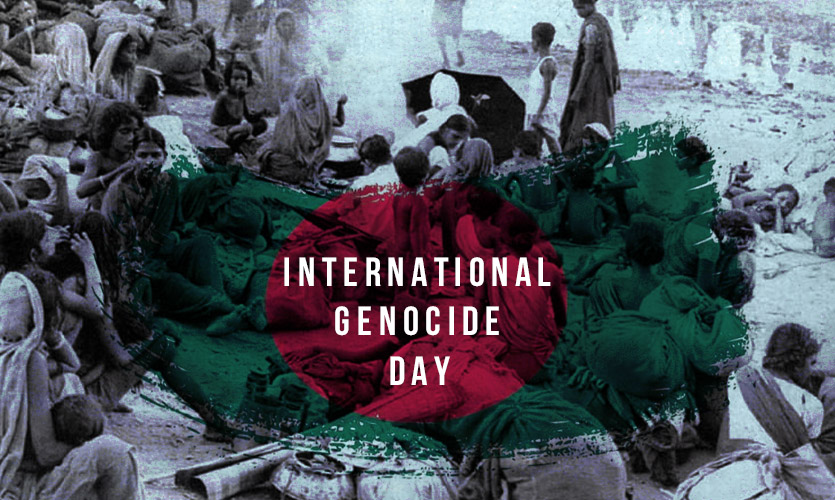Bangladeshi Foreign Minister AK Abdul is reportedly working towards marking March 25 as International Genocide Day, to remember the horrors of genocide inflicted on the country by the Pakistan military.
The genocide of Bangladesh in 1971 is a horrific memory for several Bangladeshis, which began on March 25 that year, when the ruling government of West Pakistan commenced a military crackdown on the erstwhile East Pakistan.
Data suggest that the brutal Pakistan Army and pro Pakistani Islamist militias from the Jamaat-e-Islami killed more than 300,000 people, and raped approximately 200,000 to 300,000 Bengali women, in what used to be the eastern part of Pakistan.
The Government of Bangladesh states that this record makes it the largest genocide after the holocaust during World War II.
How Did The Genocide Begin?
After the partition in 1947, the entire country was divided into two main lands – India and Pakistan. Pakistan was essentially formed so that the Muslim League could have a separate nation where the community can control their own government. It was considered that the nation of Pakistan is a Muslim-domineering nation.
The majority of the Muslim population was present in West Punjab (now Pakistan) and East Bengal (now Bangladesh). Post-independence, both the regions were called East Pakistan and West Pakistan, respectively, but were geographically and culturally distanced from each other.
The population of East Pakistan was more than that of West Pakistan, but the power lay in the hands of the latter. One of the major reasons for the 1971 war in Bangladesh was the language. West Pakistan was an Urdu speaking state, while East Pakistan was a Bengali speaking state. Trouble began when West Pakistan started forcing Urdu on East Pakistan. When all official communication started being done in Urdu, East Pakistan started revolting to save their mother tongue Bengali.
Another reason was that, presumably, West Pakistan was exploiting its eastern counterpart economically. East Pakistan had huge fields of jute and several ports that were economically important to West Pakistan. However, the region was not receiving anything when it came to development.
In March 1971, the Awami League of Bangladesh won the election, and Sheikh Mujibur Rahman received overwhelming support from the people. However, the West declared the elections invalid and dismissed the results, following which Rahman started revolting against the atrocities caused by West Pakistan. The West started a violent crackdown in East Pakistan, and soon after, on March 26, the Awami League leader declared the formation of Bangladesh, independent from Pakistan.
Pakistan, ruled by General Yahya Khan at the time, launched a full-scale military operation – “Operation Searchlight” – to restore the martial administration’s authority on Bangladesh. This turned into a heinous war scene, where the Pakistan military, along with pro-Islamist groups, started killing lakhs of people and raping the women.
The Horrors Of Genocide
The images of the genocide are still afresh in every Bangladeshi refugee’s heart, who came to India to protect his family. The massacre inflicted by Pakistan lasted for nine months, and halfway through, 200,000 Bangladeshis were reportedly killed. By the time the month of May arrived, millions of Bangladeshis were seeking refuge in neighbouring countries, and by November, 10 million people had left the country.
The recorded figure of Bengali rape victims were between 200,000 and 400,000, however, by some estimations, the actual number of cases was way too high.
Furthermore, these actions were supported by religious leaders in West Pakistan. The pro-Islamist scholars and preachers declared that Bengali women are “public-property”.
Apart from this, there was an internal conflict between Urdu speaking Biharis and Bengali speaking Biharis as well. The Bengali mob in such areas killed almost 500,000 Biharis, although most of the violence was spread by the Pakistani military.
Recognition Of International Genocide Day
Bangladeshi Foreign Minister AK Abdul started his speech at the Human Rights Museum in Winnipeg, Canada, with a video message. “The Genocide of Bangladesh committed in 1971 by the Pakistan military is one of the most heinous crimes in human history. We do not know of another instance of such barbarism of such intensity and mayhem,” he said in his speech.
“Remember and recognize: The Case of Bangladesh Genocide of 1971,” he added.
A day-long seminar was organised by the High Commission for Bangladesh and the Bangabandhu Centre for Bangladesh Studies (BCBS) in Canada, with the Liberation War Museum in Bangladesh, the Genocide Studies Centre at the University of Dhaka, the Refugees Resilience Centre, and Rotary Club, Canada.
The Bangladesh government has already declared March 25 as Genocide Day in the country. Civil society organisations have raised the issue in different international forums, to push forth the demand for the 1971 genocide recognition.
Until now, only two internationally acclaimed organisations, namely the Lemkin Institute for Genocide Prevention and Genocide Watch, have considered the incidents of 1971 as genocide.
The horrors inflicted are considered to be the worst atrocities in the history of all humanitarian crises, where the Pakistan Army enforced the most brutal yet planned military operation on civilians.
Read more: ‘Rentier Army Should Be Exposed,’ Says Taliban After Border Clash With Pakistan










